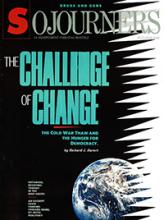The insistent message these days is that peace is breaking out. British Prime Minister Margaret Thatcher and The New York Times pronounce the Cold War over. Iran and Iraq call a halt to their bloody protracted war. The Soviets withdraw from Afghanistan, and political settlements are crafted in the hope of closing out foreign interventions into the struggles of Namibia and Kampuchea. Soviet President Mikhail Gorbachev and China's leader Deng Xiaoping meet to put aside the enmity that 20 years ago brought the two communist giants to the brink of war. The United States and the Soviet Union begin negotiations on cutting nuclear weapons and conventional forces in Europe. A new U.S. president proclaims that fresh breezes are blowing, delivers an inaugural sermon on North American materialism, and even acknowledges that--in the world's richest nation--there are people sleeping on the streets who would rather not be there.
The contrast to the war hysteria and celebration of greed in which the Reagan era began is striking. But despite these welcome shifts, for millions of people around the world there is no peace.
The economic and paramilitary war against the Sandinistas in Nicaragua continues even as the contras have become an expensive embarrassment. The carefully cultivated myths of moderation and democracy have collapsed in El Salvador, a country where there is neither reform nor development.
The United States is deeply suspicious of the peace plan of the Central American presidents. Faced with the choice of supporting the Right and continued carnage or taking the risks of a messy and uncertain peace process, the United States appears to be opting for the military "solution" where none exists but the peace of the graveyard. The Philippines is another likely locale for steadily increasing U.S. involvement in a "low-intensity war."
Read the Full Article

